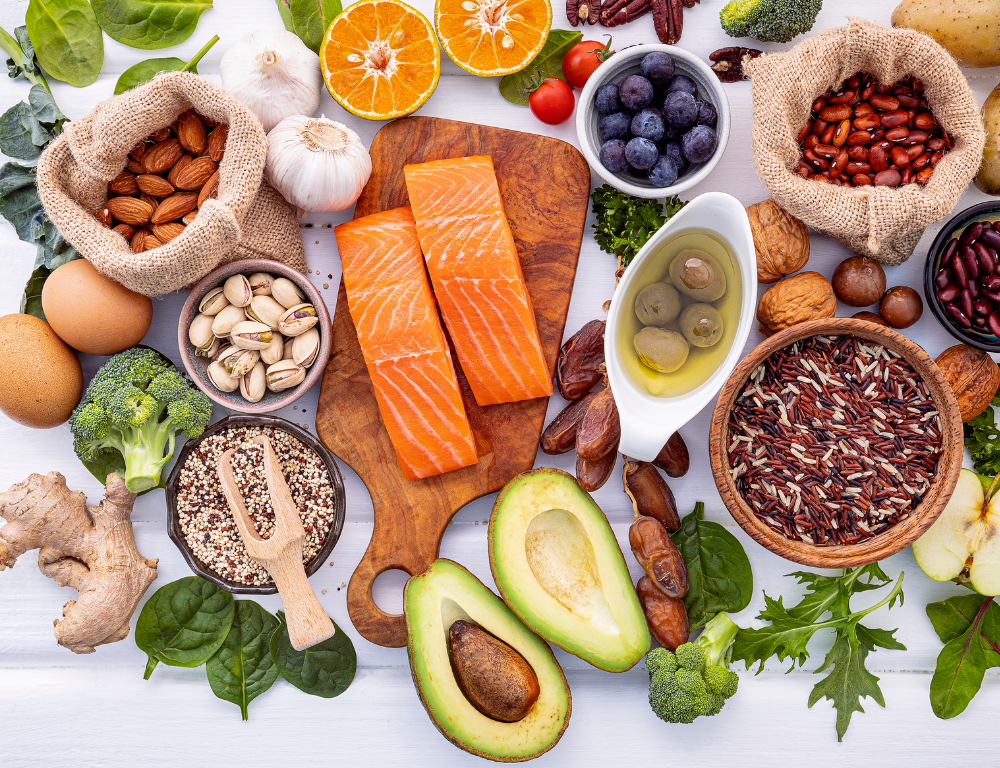Every now and then, a Mediterranean diet article pops up on my news feed. I’ll admit, I’ve often scrolled past without giving it much thought. What exactly does this diet entail? Why is it so often recommended? Let’s face it: As we age, indulging in that Chick-fil-A meal doesn’t sit as well as it once did! Also, as we get older, our metabolism slows down, making it crucial to choose a healthy diet and stay physically active for our overall well-being. So, out of curiosity and a desire to make healthier choices, I decided to delve deeper into the Mediterranean diet. Here is what I’ve found that I want to share with you!
The Details of the Diet:
The Mediterranean diet is rooted in the foods and culinary patterns of the countries bordering, you guessed it…the Mediterranean Sea. It emphasizes:
- Lean Proteins: Think fish and poultry.
- Leafy Greens: Spinach, kale, chard – the greener, the better!
- Fresh Fruits: Berries, citrus fruits, apples, and more.
- Whole Grains: Quinoa, Oats, Farro, and Barley.
- Legumes and Nuts: Almonds, walnuts, and pistachios are top picks.
- Olive Oil: The golden heart-healthy elixir.
- Alcohol: Moderate consumption of red wine
- Minimize: Red meat and sweets
The Potential Health Impacts, Especially for Women:
- Heart Health: The diet’s emphasis on omega-3-rich fish, nuts, and olive oil means you get a good dose of heart-healthy fats. For women, this can help regulate cholesterol levels, reduce the risk of heart disease, and even improve skin health by keeping it moisturized and glowing from within. These become even more important for women as estrogen lowers with age, increasing the risk of heart disease, stroke, and osteoporosis.
- Weight Management: High-fiber foods are a staple, helping you feel full and curb overeating. This is especially beneficial for women as our metabolism tends to slow down with age, making weight management a challenge.
- Mental Health: Some studies suggest benefits for reducing depressive symptoms and potentially lowering the risk of neurodegenerative diseases. A balanced diet can play a crucial role in mood regulation for women, especially those encountering hormonal changes due to pregnancy, postpartum, perimenopause, or menopause. Check out our article Mood-Boosting Foods: The Role of Essential Nutrients.
- Reduced Risk of Chronic Diseases: The antioxidants in this diet combat inflammation, reducing the risk of diseases like cancer. This means helping reduce our risk of breast and ovarian cancers, autoimmune diseases, and cardiovascular disease.
What The Experts Say:
The Mediterranean diet has been named the “best overall diet” by U.S. News & World Report for the sixth year in a row in 2023. Nutritionists and health experts praise it for its balanced and holistic approach to nutrition and its heart-healthy benefits. Hospital systems, Cardiologists, and Function Medicine doctors highly recommend this diet.
Foods to Focus On and Foods to Limit:
While the diet emphasizes fresh fruits, vegetables, whole grains, and healthy fats, limiting highly processed foods, refined carbohydrates, and red meat is equally important!
Mediterranean Diet-Inspired Sample Weekly Meal Plan:
Day 1:
- Breakfast: Full-fat plain Greek yogurt with fresh berries and a sprinkle of chia seeds.
- Lunch: Spinach, chickpea, and grilled chicken salad with olive oil dressing.
- Dinner: Grilled salmon with steamed broccoli and quinoa.
Day 2:
- Breakfast: Steel-cut oats with sliced apples, chopped walnuts, and a sprinkle of cinnamon.
- Lunch: Open-faced single slice whole grain sprouted bread sandwich with hummus, cucumber, and arugula.
- Dinner: Turkey meatballs with spiralized zucchini noodles and marina sauce, topped with fresh parmesan and mozzarella cheese.
Day 3:
- Breakfast: Kefir parfait with frozen berry mix, chia, flaxseeds, pistachios, and a sprinkle of whole-grain granola.
- Lunch: Chickpea, cucumber, red onion, spinach, red pepper, and parsley salad with lemon-olive oil dressing.
- Dinner: Grilled turkey skewers with tzatziki sauce and steamed vegetables.
Day 4:
- Breakfast: Whole grain sprouted toast topped with avocado, a squeeze of lemon, and everything bagel seasoning.
- Lunch: Tuna salad with mixed greens, olives, and a lemon-olive oil dressing.
- Dinner: Vegetable stir-fry with brown rice, lentils, and quinoa sprinkled with feta cheese.
Day 5:
- Breakfast: Chia seed pudding with almond milk and fresh strawberries.
- Lunch: Egg salad with dill, served on whole grain sprouted bread or bed or greens.
- Dinner: Ground turkey/tofu, broccoli, and edamame stir fry with cauliflower rice. Get the recipe here.
Day 6:
- Breakfast: Omelet with veggies and feta cheese.
- Lunch: Mediterranean bulgur salad with cucumbers, tomatoes, red onions, and parsley.
- Dinner: Herb-marinated grilled chicken with a side of farro and kale salad.
Day 7:
- Breakfast: Sprouted whole grain toast with almond butter and bananas topped with a pinch of salt.
- Lunch: Cauliflower rice and black bean stuffed peppers topped with avocado, cilantro, and a drizzle of olive oil.
- Dinner: Shrimp piccata with lemon, capers, artichokes, and parsley with chickpea spaghetti or spiralized zucchini noodles.
Note: Before purchasing, especially items like yogurt, marinara sauce, salad dressing, nut butters, bread, and granola, ensure you check the ingredient list to avoid any hidden sugars. Opt for brands that prioritize natural ingredients and avoid adding unnecessary sugars. Always consult with a nutritionist or dietitian if you are unsure. Read more about that here: The Hidden Sugar Effect.
Tips that can make the Mediterranean diet more convenient:
- Quick-cook whole grain blends like quinoa, lentils, and mixes are available at Target, Whole Foods, Trader Joe’s, Aldis, and most grocery stores, which makes preparing this staple much more convenient.
- Canned beans, like chickpeas and black beans, are an easy and quick way to add fiber to any dish.
- Frozen fruit blends are easy to add to smoothies, steel-cut oats, plain yogurt, or kefir parfaits.
- Frozen cauliflower rice, frozen stir-fry mixes, and frozen organic edamame are great staples in the freezer.
- If you are adventurous, canned sardines, herring, and mackerel are excellent sources of Omega-3s and are convenient. You can put them on sprouted whole-grain bread, high-fiber seed bread, or seed crackers or add them to a bed of greens.
- Some dressings contain sugar, but sugar-free options are convenient pantry staples for busy days. My favorite is Brianna’s Home Style Real French Vinaigrette Dressing. Olive oil and lemon juice with salt and pepper can also be a quick, easy, and healthy alternative to store-bought dressings.
- If you excel at meal planning, consider grilling chicken in bulk and storing it for later use during the week. If not, rotisserie chicken is a great convenience option.
- Overnight oats are a great option that you can pull out of the fridge on a busy morning, or consider preparing a large batch of steel-cut oats at the beginning of the week and storing them in the refrigerator. They are just as good cold with the toppings added!
Join Me on This Journey!
I’m excited to follow the principles of the Mediterranean diet and invite you to join me. Let’s discover the benefits of this diet together! Eating healthy is easier with a supportive group and planning. If you want the weekly shopping list and a bonus recipe, sign up to receive new posts from Hearth and Highlight and get it delivered straight to your inbox! We would love to hear from you! If you have personal experiences, insights, or recipes, leave them in the comments below! Subscrive today and receive a Grocery List for the weekly menu above and recipe!
Disclaimer: Before starting any weight loss or diet plan, it’s essential to consult with your physician or a healthcare professional to ensure it’s the right choice for your individual health needs.







![🍂✨ It’s Time for Thanksgiving Reflections! ✨🍂
Hey everyone!
Today, I’m inviting you to join a very special journey on my blog - “A Thanksgiving to Remember: Embracing the Bittersweet Beauty of Change.” This year, Thanksgiving is more than just a holiday; it’s a reflection on life’s fleeting moments, the ‘lasts’ that sneak up on us, and the joy of new beginnings.
👩👧👦 Whether it’s the nostalgia of past Thanksgivings, the thrill of new traditions, or the bittersweet feeling of an empty chair at the table, we all have stories that make this time of year unique.
➡️ Read the full post [Link in Bio and Story] and let’s share the warmth and wisdom this season brings.
📲 I would love to hear from you – your traditions, memories, and what Thanksgiving means to you. Let’s make this Thanksgiving one for the books!
#ThanksgivingMemories #ShareYourThanksgiving #FamilyTraditions #BlogPost #HeartfeltStories #KidsGrowUp #HolidayAfterLoss](http://hearthandhighlight.com/wp-content/plugins/instagram-feed-pro/img/placeholder.png)
Perfect timing I am so ready for a reset! Excited for the recipes. 💕